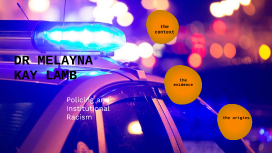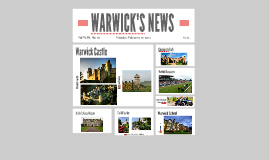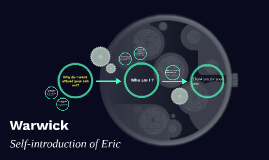Warwick Presentation
Transcript: DR MELAYNA KAY LAMB Policing and Institutional Racism What does it mean to say the police are institutionally racist? the context “The collective failure of an organisation to provide an appropriate and professional service to people because of their colour, culture, or ethnic origin. It can be seen or detected in processes, attitudes and behaviour which amount to discrimination through unwitting prejudice, ignorance, thoughtlessness and racist stereotyping which disadvantage minority ethnic people” MACPHERSON REPORT 1999 London Riots 2011 hypothesis "Mr Speaker, initially there were some peaceful demonstrations following Mark Duggan's death and understandably and appropriately the police were cautious about how they dealt with this. However, this was then used as an excuse by opportunist thugs in gangs, first in Tottenham itself, then across London and then in other cities. It is completely wrong to say there is any justifiable causal link. It is simply preposterous for anyone to suggest that people looting in Tottenham at the weekend, still less three days later Salford, were in any way doing so because of the death of Mark Duggan. The young people stealing flat screen televisions and burning shops that was not about politics or protest, it was about theft." LSE/Guardian: Reading the Riots Widespread anger and frustration at people’s every day treatment at the hands of police was a significant factor in the summer riots in every major city where disorder took place. Of the 270 people interviewed, 85% said policing was an “important” or “very important” factor in why the riots happened George Flloyd, Breonna Taylor and BLM 2020 Governor Tim Walz (Minnesota) “Let’s be very clear, the situation in Minneapolis, is no longer, in any way, about the murder of George Floyd. It is about attacking civil society, instilling fear and disrupting our great cities.” materials 05 04 03 02 01 The evidence the evidence Black people are 9 times more likely to be stopped and searched by police than white people Black people were 18 times more likely to be stopped under section 60 where reasonable suspicion is not required stop and search 2019-2020 UK stop&search Traffic Stops USA 2020 traffic stops A new study, undertaken by Ravi Shroff and his colleagues at the Stanford Open Policing Project, found that in a dataset of nearly 100 million traffic stops across the United States, black drivers were about 20 percent more likely to be stopped than white drivers relative to their share of the residential population. police violence and killings police brutality Black people in the US are 3 times more likely to be killed by police than white people. In the UK, British charity Inquest notes that BAME people die disproportionately as a result of use of force or restraint by the police with the number of BAME deaths in custody 2 times greater than others. Why is this a problem in both the UK and the US contexts? pandemic explanations explanations? 'Availability thesis' Unconscious bias Inadequate training Rates of crime "The pattern of disproportionate use of police stop/search powers is consistent with patterns of selective enforcement based on cultural stereotyping and the ‘heightened suspicion’ of black people." (Bowling and Phillips 2007) the origins The origins of policing Anti-Blackness and the afterlives of colonialism and slavery stokely carmichael “When a black family moves into a home in a white neighbourhood, and it's stoned, burned or routed out, the latter is an overt act of individual racism, and many people condemn that, in words at least. But it is institutionalized racism that keeps the black people locked in dilapidated slums, tenements, where they must live out their daily lives subject to the prey of exploiting slum landlords, merchants, loan-sharks and the restrictive practices of real-estate agents.” slavery Slave Patrols USA “While night watch groups were established in the northern colonies, groups of white men organized into slave patrols in the southern colonies. These slave patrols were responsible for controlling, returning, and punishing runaway slaves. The slave patrols helped to maintain the economic order in the southern colonies. These slave patrols are generally considered to be the first “modern” police organizations in this country. In 1837, Charleston, South Carolina, had a slave patrol with over one hundred officers, which was far larger than any northern city police force at that time” (Walker, 1999) colonialism Policing the Colonies Colonial policing involved armed forces, mercenaries, and paramilitary groups, and was honed in mid 20th century struggles to maintain colonies against uprisings – particularly in the Malayan and Kenyan “emergencies”. These became “test-cases” that developed counterinsurgency (COIN) in continuation with colonial small wars. The fundamental aim was political – with population control and incentivised collaboration supported by a network of intelligence collection

















